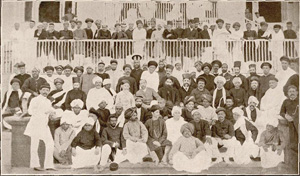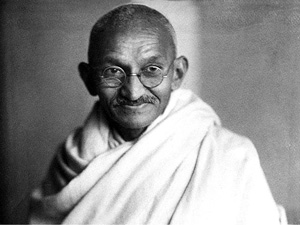
Indian National Congress (1885) with Gandhi in it
Indian National Congress
By the 1880s, India was becoming a very poor country. That was because the British government made all their choices to make Britain richer, and they didn’t care what happened to India.
Read about British India
Lots more India articles
But Britain got richer and richer by taking all of India’s wealth (as the British were also doing in Iran, and many other countries). In 1885, Indian resisters organized the Indian National Congress. The Congress tried to get more Indian men into power in the government.
What was going on in England?

Indian soldiers in Burma during World War II
World War I and India
During World War I, the British asked a lot of Indian men to serve in the British army fighting the Germans.
What was World War I about?
India after World War I
Fighting in World War I gave the Indian National Congress more power after the war was over. First, Britain was much weaker after losing so many men in the war. Second, more Indian men, especially Sikhs, were trained in modern warfare and could fight the British. Third, Britain needed to stay friends with India in case they needed Indian men to fight for them again. The Indian National Congress, under the leadership of Mohandas Gandhi, began to push for full Indian independence.

Mahatma Gandhi
World War II and India
But when Britain called for Indian men to fight in World War II, Gandhi asked for independence in exchange – and the British put the entire Indian National Congress in jail!
What was World War II about?
Most Indian soldiers fought for Britain in World War II anyway. But other Indians, like Netaji Subhash Bose, supported Nazi Germany and Japan. Japan fought the British in India.
Gandhi and non-violent demonstrations

Gandhi gathers salt on the beach at the end of the Salt March (1930)
After the war, Britain was even weaker, and India’s fighting abilities were stronger. Britain tried to keep control of India and its wealth by promising more rights for Indians. But more and more Indians participated in Gandhi’s huge non-violent demonstrations. People protested to end the hated salt tax and pressure Britain for full independence.
What was the salt tax?
India’s independence
In 1947, the Indian National Congress negotiated a deal for independence from Britain. Britain would stop its colonization and the British troops would leave India.
Partition into Pakistan and India
But Britain insisted on breaking India into two countries. Pakistan (divided into two pieces, West Pakistan and East Pakistan) would be an Islamic country, while India would be a Hindu country.
Find out more about Hinduism
What is Islam all about?
Religion in India
Gandhi fought to make India and Pakistan back into one country, but in 1948 a Hindu man shot and killed him. Ten million Indians moved to live in the “right” country for their religion, and a million more died in the riots that pushed people to move.
Learn by doing: get training in non-violent civil disobedience
Modern India
More about India
Bibliography and further reading about Indian history:
oof
hey this article help me a lot.
lot o wow
nice article
Thanks! I’m glad you liked it. If you have a teacher or a librarian who might be able to link to us from their page, we’d really appreciate that to help get the word out to other students!
much wow